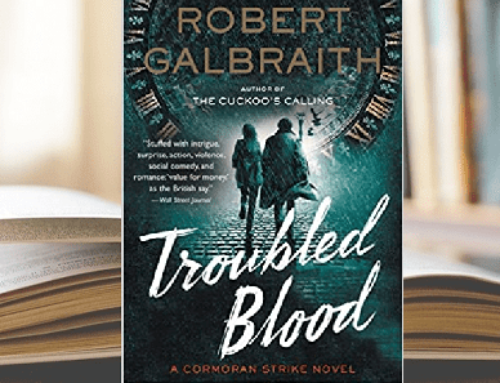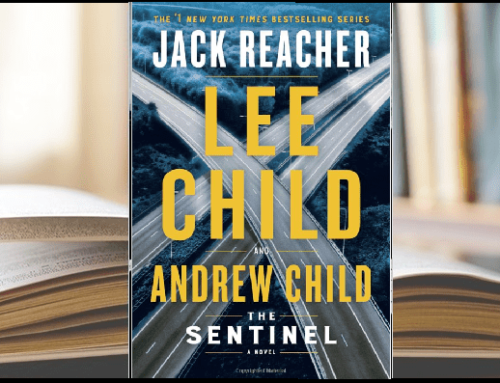[by Ross Browne]
I’m not exaggerating when I say the discovery of Joe Ide’s IQ series made an often-awful 2020 more bearable. Wrecked is the third book in this series starring the fiercely intelligent but lonely and isolated Isaiah Quintabe (“IQ”), who on first glance might resemble a modern-day Sherlock Holmes of Long Beach. In this story, Isaiah and his sidekick Dodson (kinda rhymes with Watson, doesn’t it?) help a reclusive artist find her long-lost mother and escape the wrath of five former soldiers determined to dodge accountability for torturing and recklessly abusing detainees at Iraq’s infamous Abu Ghraib prison complex.
Evil: Nature or Nurture?
While the book puts the abhorrent behavior of its villains in historical context and takes time to examine how the experience of working at Abu Ghraib may have corrupted the soldiers, I think most readers would agree these characters are pretty much miscreants through and through with little if any redeeming virtue. They welcome the opportunity for violence. They take pleasure in killing, torturing, and terrorizing with impunity. Whatever sympathy the reader might have for the toll Abu Ghraib took on their lives, it’s likely to pale in comparison to disgust and contempt for what they stand for now and how willingly they jump at the chance to make people suffer.
There are other bad guys in the book, mostly Los Angeles-area locals involved with various crimes. Like the former soldiers, they’re all sharply and imaginatively rendered without too much apparent effort at depth or three-dimensionality. One exception is Seb Habimana, the Oxford Scholar-turned gangster who helps tie this story into a series-spanning subplot—and thus gets a bit more characterization attention than the others.
I had the pleasure of meeting Joe Ide online at one of his crime writing workshops and know him to be a thoughtful and craft-minded author who wouldn’t portray his antagonists in a largely one-dimensional way without intention. And while I generally prefer bad guys who are heroes in their own mind or who do what they do based on some kind of calling to a higher purpose (however misguided), there’s something that just feels right about how Ide renders this motley crew of reprobates whom I’ll refer to as “Team Walczak” in this review. (A gang of five total: Walczak, Jimenez, Hawkins, Richter, and Owens.)
While the leader of the group is intelligent enough to have made millions as CEO of a Blackwater-esque security company after the Iraq War, Stan Walczak (don’t ask what his subordinates call him) isn’t portrayed as especially smart, likable, cunning, or commanding of respect. Though readers are told he’s a serious family man, reveling in weekend barbecues and other family gatherings, we never see that side of him firsthand. What we do see is a greedy, tough, mean sonofabitch who will stop at nothing to protect his own interests and keep the misdeeds of his past secret. I wasn’t entirely convinced by him, as he just doesn’t seem smart enough to be CEO of a megabucks corporation, but I was happy to go along for the ride. I get the feeling Ide did not want to waste time fortifying Walczak’s persona as a businessman anyway, as that’s not central to the story. What is central comes through in flying colors.
A Deliberately(?) Varied Approach to Characterization
One thing I find interesting about Wrecked from a craft standpoint is the dichotomy of approaches to various characterizations. The good guys (as always, no gender exclusion intended)—IQ himself, Dodson (his fast-talking streetwise partner), estranged daughter Grace, and her mother Sarah—all get pretty lavish attention from Ide, along with a few others. Dodson is a simply wonderful character who’s easy to like despite constantly butting heads with Isaiah. (Dodson is without a doubt the most likable ex-crack dealer / wannabe hustla I’ve met in crime fiction.) Grace is troubled and subdued but tough as nails when the going gets rough, and she’s full of surprises. IQ is IQ, a complicated stew of intelligence, shyness, competence, generosity, and gentleness. He’s a really good guy but a somewhat broken human being whose humility and awareness of his personal shortcomings give him substance and depth.
The protagonists in the novel generally come across as fully realized, complex, three-dimensional people whom readers have the opportunity to get to know and understand. They’re engaging and convincing as a result. Though some brim with larger-than-life personalities and speak in streetwise dialects that could sound cartoonish in the hands of an author less skilled with dialogue, these characters feel real, complicated, conflicted, and whole. (And entirely worthy of the attention they get from the author.)
While each of the antagonists in the novel is sharply rendered and memorably distinct from one another, their characterization is quite superficial compared to the good guys. (And I’m guessing deliberately so.) With just a few deft brushstrokes—sharpened canine teeth here, a comical misuse of vocabulary there, an addiction to burritos somewhere else—Ide breathes life into these folks and gives them a unique identity without digging too deep. The common denominator is shameless self-interest and in most cases a complete lack of conscience. The result is always entertaining, sometimes scary, and occasionally pretty darn funny.
I think there’s much to be savored, if not learned, from Ide’s approach to characterization in Wrecked. Ditto for what I supect is a very deliberate decision to make team Walczak one-dimensionally evil, render some of the other bad guys without much effort at complexity, and do the opposite for the good guys.
The Upside
On the plus side, this approach helps quicken the pace of the novel. The time Ide takes with the backstories of IQ and his mates, what’s going on in their heads, and the various pertinent subplots is time well spent, but it does slow the book a bit. (Not in a bad way; I wasn’t bored or even restless for a minute.) Had Ide taken the time to make his antagonists’ motivations more complex or take us deeper into their lives and backstories, the book would be longer and the pace slower.
Instead, he relies on greed, self-preservation, and simply but effectively supported mean streaks to render these characters. This, coupled with a memorable opening sequence that allows us to glimpse their experience at Abu Ghraib, gives readers plenty to chew on without taking too much time out from the story. Perhaps Team Walczak might have been a collection of decent people who were corrupted by PTSD and the shameful negligence of the U.S. military in the training and supervision of soldiers responsible for Abu Ghraib’s detainees. Or maybe these people were miscreants to begin with: angry, violent, hateful people who took to the conditions and demands of interrogating enemies like a duck to water. That’s up to the reader to decide. And to many, it may not matter.
The Downside
Many editors who work with writers on characterization, myself included, often advocate for the notion that the best bad guys are those readers can feel some degree of empathy with (or at least some degree of admiration for) even if we’re repulsed by their behavior. I don’t see much potential for that in Team Walczak.
We also often talk about how readers tend to love antagonists we can understand on a human level. Who see their own actions as noble, right, or justified. Who are heroes of their own stories and not just evil to serve the plot or for evil’s sake. This doesn’t apply here either—not to my experience of the story, anyway—which in my mind makes the experience of the novel a little simpler and less dynamic than it might otherwise have been.
Readers also love bad guys who are memorable enough to live on in the reader’s mind long after finishing the book. (Think Hannibal Lecter or Annie Bates.) I don’t see that happening here either.
I also think it’s fair to say there are aspects of characterization here that, while entertaining, do feel a bit cartoonish. I’d say Junior’s character is the guiltiest of this. His mutilation of the English language is sufficiently over the top to be more entertaining than believable. And who really keeps a giant dildo on display in a guest bathroom? (For a moment there, I wondered if I’d wandered into a Carl Hiaasen novel set on the wrong coast.)
The low point of characterization for me: when Junior, believing he’s charmed and enticed a woman into a hot tryst, learns she’s (allegedly) on her period and says, “Get on your knees, bitch.” It’s sad and perhaps darkly comedic in a way, but it’s a rare moment where the author lost me for a second, where the irredeemable nature of one particular character worked against the experience of the novel rather than for it. But I cheered at what happened next. (Which was not what Junior was hoping for.)
I should mention here that Wrecked is a novel full of strong women and Ide is an author no one could ever credibly accuse of being sexist or misogynistic. His stories may honor some uncomfortable truths about how women are treated, what’s expected of them, or where various lifestyles and choices may lead them. But I think he does an amazing job writing his female characters overall, and that’s one reason I love his stories so much.
The Takeaways
There are many reasons I’d recommend Joe Ide to any aspiring mystery/suspense writer, especially those writing crime fiction in urban settings. His skill with dialogue and story architecture alone is worth the price of admission.
While Righteous, the predecessor to this book in the series, is probably my favorite of the bunch, what I find so interesting about Wrecked is the showcase it delivers on different ways you can approach characterization—and the merits of each. It shows the value of going deep when needed and also staying closer to the surface when not. It affirms the value of variety, contrast, inter-character conflict from players on the same team, and how characters’ struggles to change their lives can integrate perfectly with a gripping thriller plot. It brims with examples of lively, imaginative, fresh takes on characterization that I think any writer can learn from.
It’s also one hell of an entertaining read!







